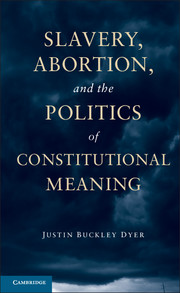Book contents
- Frontmatter
- Contents
- Acknowledgments
- Preface
- 1 The Conscience of a Nation
- 2 Substance, Procedure, and Fourteenth Amendment Rights
- 3 Dred Scott, Lochner, and the New Abortion Liberty
- 4 Constitutional Disharmony after Roe
- 5 The Politics of Abortion History
- 6 Private Morality, Public Reasons
- 7 Personhood and the Ethics of Life
- Index
Preface
Published online by Cambridge University Press: 05 April 2013
- Frontmatter
- Contents
- Acknowledgments
- Preface
- 1 The Conscience of a Nation
- 2 Substance, Procedure, and Fourteenth Amendment Rights
- 3 Dred Scott, Lochner, and the New Abortion Liberty
- 4 Constitutional Disharmony after Roe
- 5 The Politics of Abortion History
- 6 Private Morality, Public Reasons
- 7 Personhood and the Ethics of Life
- Index
Summary
There is a pervasive feeling among many conscientious citizens that the battle over the institution of slavery in the nineteenth century somehow sheds light on the contours of contemporary American politics. The Supreme Court’s landmark decision in Roe v. Wade (1973), which established a constitutional right to abortion, is repeatedly mentioned in the same breath as the Court’s notorious pro-slavery ruling in Dred Scott v. Sandford (1857). Prominent pro-life politicians and judges routinely accuse opponents of engaging in Dred Scott–like legal reasoning, and activists of various stripes proclaim their commitment to a standard of lawfulness that transcends any mere Supreme Court opinion. Meanwhile, many participants in the anti-abortion movement claim to be following in the footsteps of the Great Emancipator, Abraham Lincoln, even as those who resort to violence see themselves as the progeny of the radical abolitionist and domestic terrorist John Brown. For many Americans, the abortion controversy touches a deep nerve, and the search for historical analogs continually leads back to the memory of slavery and abolition.
Similar, perhaps, to the ways in which the legacies of Nazism and Fascism are haphazardly thrown around in our political discourse, many of the contemporary invocations of slavery are, no doubt, sloppy attempts to score partisan points over ideological rivals. Still, slavery and abortion do have a historical, philosophical, and legal nexus in American history. That nexus, however, is subtler and more nuanced than is often suggested, and it is bound up with the meaning and legacy of the Constitution’s Fourteenth Amendment, which has become the primary vehicle for the Supreme Court’s modern abortion jurisprudence. The story of how an amendment to the Constitution designed to protect the civil rights of newly freed slaves led to the overturning of state abortion laws nearly a century later is complex, to say the least, but one of the key intellectual developments was the rejection of the natural law tradition by influential thinkers in the early twentieth century.
- Type
- Chapter
- Information
- Publisher: Cambridge University PressPrint publication year: 2013

